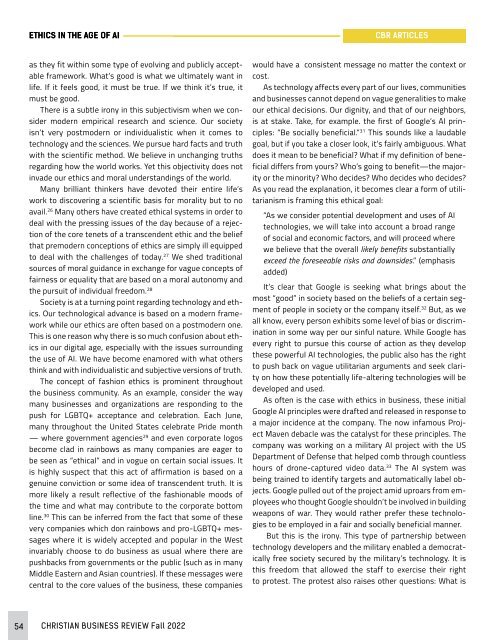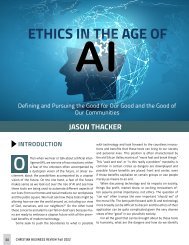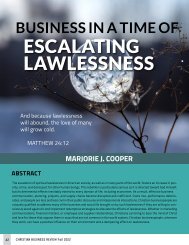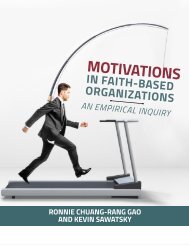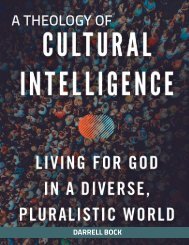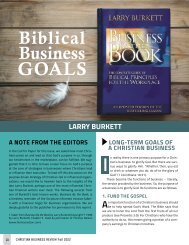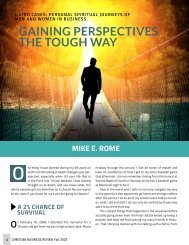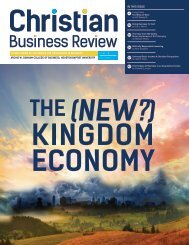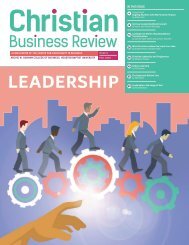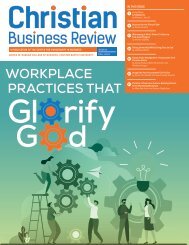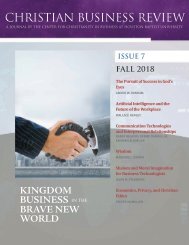Christian Business Review 2022: Pressing On Toward God's Goal
Create successful ePaper yourself
Turn your PDF publications into a flip-book with our unique Google optimized e-Paper software.
ETHICS IN THE AGE OF AI<br />
CBR ARTICLES<br />
as they fit within some type of evolving and publicly acceptable<br />
framework. What’s good is what we ultimately want in<br />
life. If it feels good, it must be true. If we think it’s true, it<br />
must be good.<br />
There is a subtle irony in this subjectivism when we consider<br />
modern empirical research and science. Our society<br />
isn’t very postmodern or individualistic when it comes to<br />
technology and the sciences. We pursue hard facts and truth<br />
with the scientific method. We believe in unchanging truths<br />
regarding how the world works. Yet this objectivity does not<br />
invade our ethics and moral understandings of the world.<br />
Many brilliant thinkers have devoted their entire life’s<br />
work to discovering a scientific basis for morality but to no<br />
avail. 26 Many others have created ethical systems in order to<br />
deal with the pressing issues of the day because of a rejection<br />
of the core tenets of a transcendent ethic and the belief<br />
that premodern conceptions of ethics are simply ill equipped<br />
to deal with the challenges of today. 27 We shed traditional<br />
sources of moral guidance in exchange for vague concepts of<br />
fairness or equality that are based on a moral autonomy and<br />
the pursuit of individual freedom. 28<br />
Society is at a turning point regarding technology and ethics.<br />
Our technological advance is based on a modern framework<br />
while our ethics are often based on a postmodern one.<br />
This is one reason why there is so much confusion about ethics<br />
in our digital age, especially with the issues surrounding<br />
the use of AI. We have become enamored with what others<br />
think and with individualistic and subjective versions of truth.<br />
The concept of fashion ethics is prominent throughout<br />
the business community. As an example, consider the way<br />
many businesses and organizations are responding to the<br />
push for LGBTQ+ acceptance and celebration. Each June,<br />
many throughout the United States celebrate Pride month<br />
— where government agencies 29 and even corporate logos<br />
become clad in rainbows as many companies are eager to<br />
be seen as “ethical” and in vogue on certain social issues. It<br />
is highly suspect that this act of affirmation is based on a<br />
genuine conviction or some idea of transcendent truth. It is<br />
more likely a result reflective of the fashionable moods of<br />
the time and what may contribute to the corporate bottom<br />
line. 30 This can be inferred from the fact that some of these<br />
very companies which don rainbows and pro-LGBTQ+ messages<br />
where it is widely accepted and popular in the West<br />
invariably choose to do business as usual where there are<br />
pushbacks from governments or the public (such as in many<br />
Middle Eastern and Asian countries). If these messages were<br />
central to the core values of the business, these companies<br />
would have a consistent message no matter the context or<br />
cost.<br />
As technology affects every part of our lives, communities<br />
and businesses cannot depend on vague generalities to make<br />
our ethical decisions. Our dignity, and that of our neighbors,<br />
is at stake. Take, for example. the first of Google’s AI principles:<br />
“Be socially beneficial.” 31 This sounds like a laudable<br />
goal, but if you take a closer look, it’s fairly ambiguous. What<br />
does it mean to be beneficial? What if my definition of beneficial<br />
differs from yours? Who’s going to benefit—the majority<br />
or the minority? Who decides? Who decides who decides?<br />
As you read the explanation, it becomes clear a form of utilitarianism<br />
is framing this ethical goal:<br />
“As we consider potential development and uses of AI<br />
technologies, we will take into account a broad range<br />
of social and economic factors, and will proceed where<br />
we believe that the overall likely benefits substantially<br />
exceed the foreseeable risks and downsides.” (emphasis<br />
added)<br />
It’s clear that Google is seeking what brings about the<br />
most “good” in society based on the beliefs of a certain segment<br />
of people in society or the company itself. 32 But, as we<br />
all know, every person exhibits some level of bias or discrimination<br />
in some way per our sinful nature. While Google has<br />
every right to pursue this course of action as they develop<br />
these powerful AI technologies, the public also has the right<br />
to push back on vague utilitarian arguments and seek clarity<br />
on how these potentially life-altering technologies will be<br />
developed and used.<br />
As often is the case with ethics in business, these initial<br />
Google AI principles were drafted and released in response to<br />
a major incidence at the company. The now infamous Project<br />
Maven debacle was the catalyst for these principles. The<br />
company was working on a military AI project with the US<br />
Department of Defense that helped comb through countless<br />
hours of drone-captured video data. 33 The AI system was<br />
being trained to identify targets and automatically label objects.<br />
Google pulled out of the project amid uproars from employees<br />
who thought Google shouldn’t be involved in building<br />
weapons of war. They would rather prefer these technologies<br />
to be employed in a fair and socially beneficial manner.<br />
But this is the irony. This type of partnership between<br />
technology developers and the military enabled a democratically<br />
free society secured by the military’s technology. It is<br />
this freedom that allowed the staff to exercise their right<br />
to protest. The protest also raises other questions: What is<br />
54<br />
CHRISTIAN BUSINESS REVIEW Fall <strong>2022</strong>


